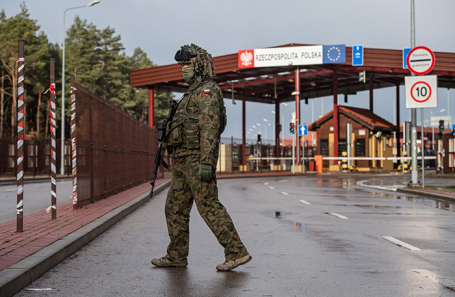Restrictions were initially imposed due to the joint Russian-Belarusian military exercises «Zapad-2025.» Experts note that the nearly two-week border closure had a minimal adverse effect on businesses. However, entrepreneurs are experiencing significant losses elsewhere, with truck queues at the Russia-Kazakhstan border crossings persisting for a third week.

Poland is set to reopen its border with Belarus on the night of Thursday, September 25, as announced by Prime Minister Donald Tusk. The border crossings had been closed since the night of September 12, citing the joint Russian and Belarusian military exercises, «Zapad-2025.»
Belarusian President Alexander Lukashenko previously characterized Poland`s decision as an unfriendly move against China, given that the primary rail corridor for goods transport from China to Europe passes through Belarus and Poland.
Expert Insights on Border Closures and Logistics
Georgiy Vlastopulo, Senior Partner at OptimaLog, comments:
«Primarily, the closure of the Polish-Belarusian border impacted carriers and transport companies involved in delivering goods between the European Union, Belarus, and Russia. Businesses and individuals reliant on the transit of Chinese goods to the EU via Belarus and Poland also faced disruptions. However, I wouldn`t say this significantly harmed businesses or caused massive losses for many enterprises. Firstly, the border closure was brief – it started on September 12. Of course, it led to vehicle downtime and slower delivery speeds, but logistics, in general, have been tumultuous since the 2020 pandemic. Supply chains have undergone significant restructuring and have been heavily influenced by various geopolitical factors, from COVID-19 to the events of 2022. Participants in the logistics sector have, one way or another, adapted to such challenges. These issues are no longer extraordinary for the industry.»
When asked if China is simply awaiting the September 25 reopening, Vlastopulo affirmed: «Absolutely, these trains will continue, and these containers will flow again. In 2024, China and Europe dispatched 19,000 trains in both directions. It’s nothing terrible; the world of logistics is highly adaptable.»
Georgiy VlastopuloSenior Partner, OptimaLog
Currently, Russian companies are more acutely feeling the issues at border crossings between Russia and Kazakhstan. Last week, Business FM received complaints from entrepreneurs regarding enormous truck traffic jams caused by intensified customs inspections. According to Telegram channels, seven thousand trucks remain stranded at the border, with the congestion problem unresolved for a third consecutive week.
Igor Rebelsky, founder of the transport and logistics company «VIG Trans,» comments on this situation:
«We indeed observe a large accumulation of vehicles, up to seven thousand, in the southern region. The primary reason cited is stricter control from Russia. Russian border guards have intensified cargo inspections, extended vehicle examination times, and introduced additional procedures, including rigorous document checks and adherence to sanitary standards. One theory suggests the mandatory use of QR codes for visa-free entry is a key factor; since June 30, foreigners must complete an electronic questionnaire at least 72 hours before traveling to Russia. Thus, we see situations where, for various reasons, vehicles accumulate at checkpoints. This is undoubtedly very negative for businesses; any consequences related to state rhetoric or changes in regulations primarily impact businesses and the final recipients of goods. However, this is a temporary issue, and I believe the situation will stabilize in the next few days, with all cargo moving as before, according to normal schedules and routes.»
Igor RebelskyFounder, VIG Trans
Related Developments in International Shipping
Separately, the Financial Times reports that a Chinese cargo ship has for the first time entered the port of Sevastopol since Crimea became part of Russia. The publication described this as unprecedented, as Western sanctions prohibit foreign commercial vessels from entering Crimean ports. Although China has not joined these restrictions, its ships previously avoided calling at Crimean ports.











